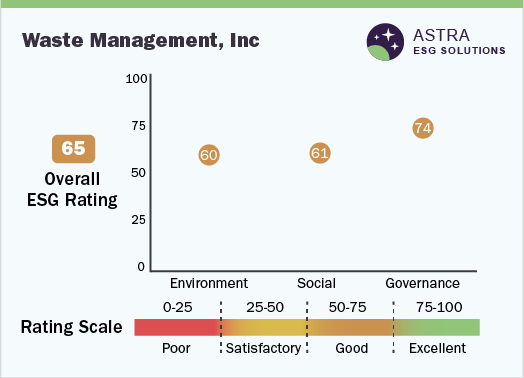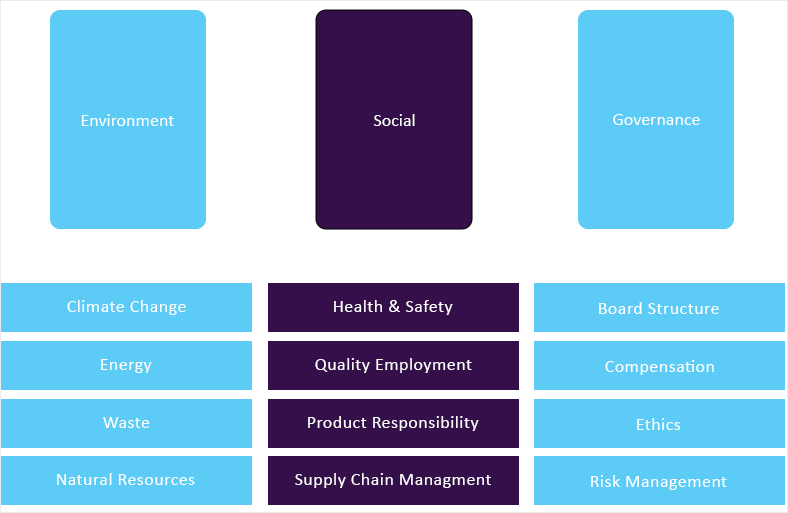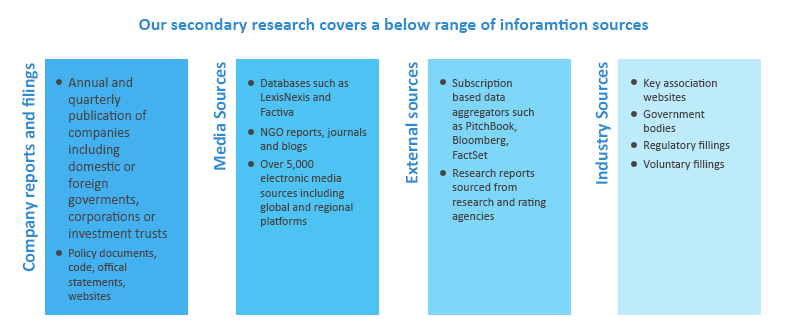Compliance, ESG Challenges & Framework, ESG Trends
- Report Summary
- Methodology
- Request for ESG Consultation
Environmental, Social, and Governance (ESG) in Waste Management, Inc.
Waste Management, Inc. is a waste management, comprehensive waste, and environmental services company operating in North America.
The company has been focusing on sustainability due to effective due diligence and better investment decision for the company as well as relevant stakeholders. The company has various products and services including Trash collection and recycling for home, waste disposal, and recycling for business, among others. These services and products focus on different sustainability strategies as their main operation is intended to reduce waste, decrease emissions, and use more recycled materials. The company’s key focus areas include its sustainability program partner, the development of a modern landfill, incorporating renewable energy in its operations, the developing of a recycling infrastructure, and promoting integrated organics and circular logistics. The company has also given importance to health and safety, Diversity, Equity, And Inclusion (DEI), and various community engagement programs to deliver a positive social impact.
ESG Trends
The company has various ESG strategies with around $1.625B in planned investments carried out to promote sustainability for the next four years (2021-2025) to grow its recycling and renewable energy businesses. Waste Management, Inc. aims to positively impact 10 million people in communities through targeted social impact programs by 2030, using the equivalent of 2% of our net income each year. They are reorienting the focus of our social impact program around sustainability education, environmental conservation, environmental justice, community vitality, supplier diversity, and skills and workforce development. They plan to double their annual social impact investments over the coming years to reach more people and create greater change.

The company has been raising the bar on safety where it has reduced the Total Recordable Incident Rate (TRIR) by 3% annually and targets zero incidents by 2030 with a focus on preventing serious injuries. The rate of injuries per employee hours worked has continued to fall for almost 20 years, with Waste Management, Inc. consistently outperforming its competitors. They continue to ensure initiatives are taken to prevent injuries and have an illness management program alongside other initiatives. In 2021, women represented 18% of the workforce at the firm and 41% of the workforce were from different ethnicities.
Future of ESG in Waste Management Inc
In 2021, Waste Management, Inc.’s revenue was around USD18 billion. The company envisions various aspects including sustainability as one of the main agenda, with promising innovation and product development side supporting sustainability.
Research methodology
Grand View Research (GVR) employs a holistic and robust research methodology focused on delivering precision. Our ESG key issues are selected following a thorough materiality analysis run by our taxonomy committee. We examine leading business journals relevant to the industry sector and where applicable references are made to a range of sources including regulatory agencies, trade associations, company filings, white papers, and analyst reports during the due diligence on data aggregation. In addition, a recurring theme that remains central to all our research reports remains data triangulation which aims to dive into the market from thematic context, regulation, and industry benchmarking, including SWOT analysis.
Eligibility Criteria and Company Selection
Each public company is curated by our senior researchers following a comprehensive study of their business involvement around a specific theme. The involvement extends to subsidiaries based on at least 50% holding by the parent company. Following this, we analyze fundamental financial indicators, including revenue and market capitalization to ensure a diverse set of companies that fairly represent the sector are included. Additionally, GVR researchers ensure the disclosure level of each company across the material ESG key issues.
Scoring Methodology
Each ESG metric is assigned a specific weight based on its relevance across sectors. Below are the aggregated weights across pillars, which are derived from each metric.
| Environment | Social | Governance |
| 40% | 30% | 30% |
GVR’s proprietary ESG score is calculated using a weighted average method at:
• Key issues level
• Pillar level
• Company level and,
• Theme level
Data Mining
Data is obtained and collated from diverse source points. The data collected is continuously cleansed to ensure that only validated and verifiable sources are analyzed. In addition, data is also mined from a large number of in-house syndicated research reports inventory as well as through paid databases and premium content. During this research report, we conducted multiple primary interviews across the globe supported by our Primary Research Panels through the delivery of a mix of paid and unpaid interviews. We also send and receive responses from a wide section of industry participants through a carefully crafted and comprehensive survey questionnaire. We triangulate these data into quant models and generate qualitative insights. Evolving industry dynamics that shape drivers, restraints, and pricing are also gathered. As a result, the published content includes proprietary data and meaningful insights.
Fundamental ESG data:
GVR’s ESG taxonomy committee maintains the framework and ensures it is updated quarterly considering market updates and relevance. Framework includes 65+ fundamental ESG metrics that are identified following a thorough materiality assessment. Below is GVR’s ESG Level-I framework:

Alternative ESG data:
GVR also analyzes macro-economic factors that impact or drive the growth of respective sectors. This includes
• Deep dive analysis of policy and regulatory landscape that has potential towards shaping the future of businesses
• Innovation quotient of a sector to gauge prospective evolution of a theme and related opportunities
• Investment scenario, including mergers & acquisition, funding and other deals to assess the investment appetite for a particular theme
• Other market activities, including market size, growth forecasts among others.
Information sources

